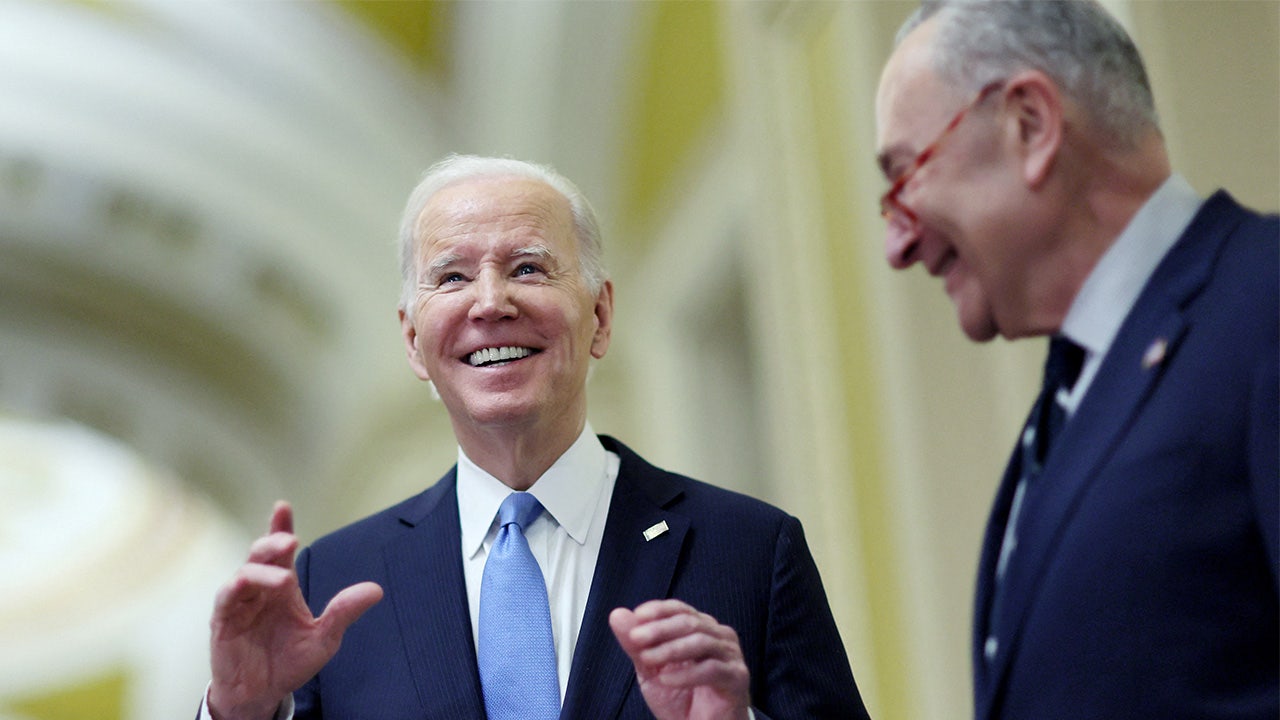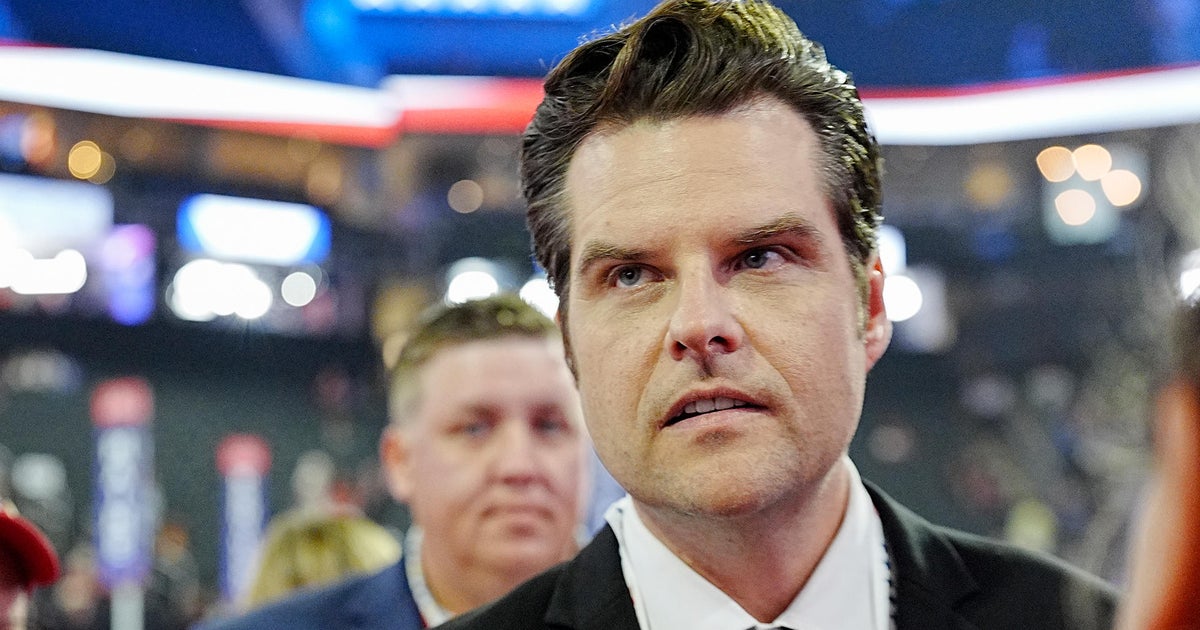Business
Video: Elizabeth Holmes Reports to Federal Prison

new video loaded: Elizabeth Holmes Reports to Federal Prison
transcript
transcript
Elizabeth Holmes Reports to Federal Prison
The founder of the failed blood testing start-up Theranos turned herself in at the federal prison in Bryan, Texas.
-
Elizabeth!
Recent episodes in Business

Business
Column: Trump's anti-science backers go after water fluoridation, a historic healthcare success

Regular visits to the dentist to fill cavities used to be a shared ordeal for millions of American children and adults. The reason that hasn’t been the case for late baby boomers and subsequent generations is that the fluoridation of drinking water became common starting in the late 1940s and continuing today.
So it’s right to question why Donald Trump’s nominee to head the Department of Health and Human Services, Robert F. Kennedy Jr., has placed the ending of fluoridation atop his list of first-day initiatives in his campaign against American public health.
“On January 20,” Kennedy tweeted a few days before the election, “the Trump White House will advise all U.S. water systems to remove fluoride from public water.”
‘Fluoridation is the most monstrously conceived and dangerous Communist plot we have ever had to face.’
— The unhinged Gen. Jack D. Ripper in the 1964 film ‘Dr. Strangelove’
The reason, he asserted, is that “fluoride is an industrial waste associated with arthritis, bone fractures, bone cancer, IQ loss, neurodevelopmental disorders, and thyroid disease.”
That’s all flatly untrue or grossly misleading. Kennedy’s screed against fluoridation is part and parcel of a policy package that has legitimate scientists warning of a public health catastrophe in the making.
Fluoridation of tap water has generated local controversies ever since it was introduced in the U.S. in 1945. But it remains fully supported by a majority of Americans and by professional organizations including the American Dental Assn. and the American Academy of Pediatrics. That suggests that the proper stance of a Health and Human Services secretary would be to voice support for the practice. Kennedy has done just the opposite.
According to the Centers for Disease Control and Prevention, fluoridation is one of the 10 great public health achievements of the 20th century, up there with vaccination, family planning and recognition of the health dangers of tobacco.
Fluoridation revolutionized dentistry, especially for children. Fluoridation of tap water was credited with reducing the incidence of tooth decay by as much as 70% when it was first introduced; by the mid-1980s, when other sources of fluoride, such as fortified toothpastes, were available, the effects of tooth decay in children were still 18% lower among those living in fluoridation communities than in those without it.
Who would benefit from the end of community fluoridation and a recrudescence of tooth decay? Dental supply companies, investors in which are rubbing their hands in glee at the prospect of more demand for their products. For example, shares of Henry Schein Inc., a distributor of specialty dental products, have risen more than 9% since RFK Jr. was named as Trump’s choice for HHS secretary.
Kennedy’s tweet about fluoridation exemplifies the anti-vaccine crowd’s method of casting doubt on established public health policies. There are two elements. One is to portray rare adverse health effects — some so rare that their very existence is questionable — as major and acute threats. The second is to downplay the beneficial effects of a policy. That leaves the public believing that the policy has only adverse effects, and that those are immediate and severe.
Tooth decay is a little-recognized public health problem, in part because fluoridation has made it rarer than it used to be. But it hasn’t disappeared. The American Academy of Pediatrics calls it “one of the most common chronic diseases in children,” and one that can have “lifelong consequences.” It disproportionately affects children who are racial minorities, come from low-income families or have special needs.
It’s not only about the occasional toothache or cavity needing filling. Tooth decay can produce “incapacitating pain,” bacterial infection that may spread throughout the body, and, of course, to the loss of a tooth. In the first part of the last century, the only remedy for decay was to pull the tooth.
As of 2012, two-thirds of Americans had access to fluoridated tap water. Thanks to fluoridation, the CDC says, “tooth loss is no longer considered inevitable, and increasingly adults in the United States are retaining most of their teeth for a lifetime.”
More baby boomers reached 60 with “a relatively intact dentition at that age than any generation in history,” the CDC says. Interestingly, that makes water fluoridation more important than ever, since it means that seniors have more teeth vulnerable to decay than before.
Communities that have ended fluoridation have seen dental illnesses soar. Since fluoride was removed from drinking water in Calgary, Alberta, Canada, in 2011, Alberta Children’s Hospital has seen dental infections requiring treatment with IV antibiotics increase by 700%, a hospital specialist told the City Council in 2019. Half of those infections were in children younger than 5.
Windsor, Ontario, Canada, voted in 2018 to resume fluoridation five years after it had ended the program, after discovering that the number of children with tooth decay or oral conditions requiring urgent care had increased by 51% in the interim.
Opponents of fluoridation have played on paranoid fears for decades, but into the 1960s, these were popularly dismissed as ravings from fringe organizations. In the 1964 film “Dr. Strangelove,” the unhinged Gen. Jack D. Ripper declares that “fluoridation is the most monstrously conceived and dangerous Communist plot we have ever had to face” — echoing the position of the John Birch Society.
The anti-fluoridation camp has long claimed that the process “increased the risk for cancer, Down syndrome, heart disease, osteoporosis and bone fracture, acquired immunodeficiency syndrome, low intelligence, Alzheimer disease, allergic reactions, and other health conditions,” the CDC noted in 1999. “No credible evidence supports an association between fluoridation and any of these conditions,” the agency stated.
More recently, critics object that fluoridation “is being imposed on them by the states and as an infringement on their freedom of choice,” the National Research Council reported in 2006 — similar to the elevation of individual “freedoms” over communal interests that animates the anti-vaccine movement.
The anti-fluoridation camp scored a legal victory in September, when federal Judge Edward M. Chen of San Francisco, an Obama appointee, ordered the Environmental Protection Agency to review its safety standard for fluoridation in tap water. Chen concluded not that “fluoridated water is injurious to public health” but that “there is unreasonable risk of such injury,” triggering a legal mandate that the EPA take a closer look.
Chen’s findings were heavily based on a government study with a checkered research history. More on that shortly. Despite the limitations of his order, it may well be taken as a validation of suspicions about fluoridation.
What of RFK Jr.’s roster of adverse health effects? Let’s take them one by one. To begin, although fluoride can be a byproduct of industrial processes, it’s also a mineral naturally present in soil, groundwater, plants and food.
Arthritis? The National Research Council’s 2006 analysis of government fluoride standards identified “no indications” in the existing scientific literature implying “that fluoride had a causal relationship with … rheumatoid arthritis.”
Bone fractures? The 2006 analysis determined that the leading evidence for fluoride’s effect on bone strength pointed to lifetime exposure to fluoride at concentrations at or exceeding 4 milligrams per liter, which is more than five times the concentration in fluoridated tap water. The effect was found chiefly in people prone to concentrating fluoride in their bones, such as those with kidney disease.
Bone cancer? The main source of this claim appears to be a 15-year study led by the Harvard School of Dental Medicine, published in 2006 in the journal Cancer Causes and Controls.
In the same issue of the journal, however, two Harvard experts cast doubt on the study, noting that the original researchers were unable to replicate their findings when they repeated their study with new subjects. The results, they said, “do not suggest an overall association between fluoride and osteosarcoma” (that is, bone cancer).
Evidence of “thyroid disease,” as Kennedy tweeted, is similarly inconclusive, especially at the approved levels of fluoride in tap water.
That brings us to Chen’s ruling in the San Francisco lawsuit. His findings relied heavily on a monograph by the National Toxicology Program first published in 2019. The paper initially concluded that “fluoride is presumed to be a cognitive neurodevelopmental hazard to humans,” based on findings that children exposed to high concentrations of fluoride showed lower IQs than others.
The survey focused on the effect of water with more than 1.5 milligrams of fluoride per liter, more than twice the approved level in the United States. It acknowledged that it had only “moderate confidence” that such concentrations could result in lower IQs, and stated that it had “insufficient data” to determine that the 0.7 mg/liter concentration in fluoridated tap water affects IQ.
There were lots of problems with the National Toxicology Program’s monograph. Two peer reviews by the National Academies of Sciences, Engineering, and Medicine essentially ripped it apart, rejecting it both times. The program “had not adequately supported its conclusions,” the peer reviewers wrote.
The monograph lacked a “rigorous statistical review.” The reviewers recommended that the program “make it clear that the monograph cannot be used to draw any conclusions regarding low fluoride exposure concentrations … typically associated with drinking-water fluoridation.” Among other changes in the final monograph published this summer, the program removed references to a “neurodevelopmental hazard to humans.”
Critics also pointed out the inherent problems with treating IQ as an all-purpose measure of intelligence, since it’s well-known that IQ can be affected by “socioeconomic, physical, familial, cultural, genetic, nutritional, and environmental factors,” the American Academy of Pediatrics observes.
Kennedy’s mindset is curious: He has promoted treatment of COVID-19 with ivermectin and hydroxychloroquine, which have been proven to be useless for the purpose, but he campaigns against fluoridation, which has demonstrated a health benefit over nearly eight decades. Is this any way to run a public health agency such as the HHS?
Business
With Trump as president, can TikTok in the U.S. survive?

The fate of TikTok in the U.S. has been up in the air since 2020, when President Donald Trump moved to ban the popular video app because of national security concerns.
That set off four years of back-and-forth between the app’s Chinese owners and the U.S. government, with a possible ban scheduled to go into effect one day before Trump’s inauguration in January.
One hitch: Trump recently changed his mind, joining TikTok in June and posting on social media, “Those who want to save TikTok in America, vote for Trump.”
“We’re not doing anything with TikTok,” he said.
That has given some creators hope.
“The fact that Trump did a whole 180 and wants to wait and reassess how everything is going with TikTok — I think we’re going to be OK,” said creator Kat Vera, 34, who posts fitness and car content and has 457,000 followers on TikTok.
But there are factors that complicate the app’s position. Several legal experts and tech industry observers said the path forward for TikTok is still precarious.
“It’s just a huge mess, and it isn’t clear,” said Carl Tobias, a law professor at the University of Richmond.
In April, Biden signed a law passed by Congress that would require TikTok’s Chinese parent company, ByteDance, to divest its ownership of TikTok by Jan. 19 or face a ban in the U.S. due to security concerns about the app’s ties to China.
Biden has the option to extend ByteDance’s deadline, but some legal experts said that is unlikely. Changing the law would require approval by Congress, they said. Instead, some believe that the matter could be settled in the D.C. Circuit Court of Appeals.
TikTok and ByteDance sued the U.S. government in May, alleging that banning the app would violate 1st Amendment rights to freedom of speech and that the new law “offers no support for the idea” that TikTok’s Chinese ownership poses national security risks.
Experts said they expect that the court will make a decision next month. If the court rules in favor of TikTok and ByteDance, then the law will be declared unconstitutional and the government is unlikely to appeal under the incoming Trump administration.
But if the court rules against the app and the tech giant, they could appeal to the Supreme Court and ask to have the new law paused, said Michael Stovsky, a partner at law firm Benesch in Cleveland.
“They’re gonna probably ask the court to say, ‘Look, don’t enforce the law. Don’t require it to divest until the Supreme Court has heard the case,” Stovsky said.
Representatives for TikTok and the Trump administration did not respond to requests for comment.
In a court filing, TikTok and ByteDance said that they’ve tried to work with the U.S. government’s Committee on Foreign Investment to address security concerns since 2019.
Under the terms of a deal spelled out in a 90-page draft agreement, data collected about TikTok users in the U.S. was to be handled by U.S. tech giant Oracle. The proposed agreement also called for Oracle to inspect TikTok’s programming code for vulnerabilities and for the platform’s content to be subject to independent monitoring.
If TikTok did not comply, the draft agreement called for financial penalties and also included the possibility of suspending TikTok’s operations in the U.S. TikTok and ByteDance said it‘s unclear why the committee ultimately determined the proposed agreement was insufficient.
Meanwhile, Trump has changed his tune about TikTok, at least in part for apparently personal reasons and his animus for the app’s rivals. Earlier this year he called himself a “big star on TikTok.”
“If you get rid of TikTok, Facebook and Zuckerschmuck will double their business,” Trump wrote on Truth Social in March, referring to Mark Zuckerberg, the CEO of Facebook’s parent company, Meta. “I don’t want Facebook, who cheated in the last Election, doing better. They are a true Enemy of the People!”
Republican leaders have accused the social media site of censoring conservative viewpoints, which Facebook refuted, saying it has guidelines that “do not permit the suppression of political perspectives.”
Trump, who has 14.6 million followers on TikTok, joined the popular video app months after he met with Jeff Yass, a ByteDance investor, major Republican party donor and co-founder and managing partner of Susquehanna International Group, but Trump told CNBC they did not discuss TikTok.
People who had worked for Trump also have joined TikTok’s cause. Club for Growth, a conservative economic organization, hired former Trump aide Kellyanne Conway to advocate for TikTok in Congress, according to Politico.
But the Trump administration will have to deal with differing viewpoints within the Republican party on TikTok, with some preferring a hard line toward China.
“I think it’s going to become a chip in a much larger game involving tariffs with China, security agreements, all that, and that TikTok is going to be part of a bigger equation,” said Freddy Tran Nager, associate director of USC Annenberg’s Digital Social Media master’s program.
TikTok has a significant presence in Culver City, employing roughly 440 people there, according to city estimates. The company, which has 170 million U.S. users, has been a significant tool for promoting content by video creators, small businesses, music artists and Hollywood studios.
Earlier this year, TikTok notified the state of California that it would lay off 58 employees in Culver City in July “due to restructuring.” Positions affected included senior business analysts and global product specialists.
Many creators have already diversified into publishing their content on other platforms, so they aren’t solely reliant on TikTok. Some say the money-making opportunities are better on rival services.
Theodora Moutinho, a fitness creator and actress from Glendale, said she has learned to always adapt in the fast-changing world of social media.
The 25-year-old became a creator in 2017 and today has 4.2 million followers on Instagram, 1.3 million on TikTok and 421,000 on Snapchat. These days, she’s putting more effort into her Snapchat and Instagram accounts, while keeping an eye on newer platforms such as Bluesky.
“Ever since it was up in the air that they were going to take it off, not take it off, I kind of stopped really focusing on it,” Moutinho said of TikTok. “Because why try to grow something if it might come down?”
Times news researcher Scott Wilson contributed to this report.
Business
Google could be forced to sell Chrome. Here's what you need to know

Google and federal officials are battling it out over a proposal that the tech giant be forced to sell its popular Chrome web browser to restore competition to the online search market.
The proposal, filed by the U.S. Department of Justice and several states this week, came after a federal judge ruled that Google maintained an illegal monopoly over internet search.
The landmark decision opened the door to the current showdown over potential remedies that could reshape the tech giant’s multibillion-dollar business. As part of their proposed penalties, Justice Department officials also suggested the judge impose restrictions on Android, Google’s mobile operating system, to prevent it from favoring Google products.
The Department of Justice says forcing Google to divest Chrome would create more competition and stop the search giant’s control over a “browser that for many users is a gateway to the internet.” Google pushed back, calling the request an “unprecedented government overreach” that would harm consumers and U.S. tech leadership.
“This is to some extent a negotiating dance,” said George Hay, a Cornell University law professor and antitrust expert. “The DOJ is probably trying to get Google to be more cooperative in coming up with remedies that will fix the problem.”
Here’s what you need to know:
What are U.S. officials proposing?
The Justice Department outlined for the judge several possible solutions in its 23-page court filing, including forcing Google to sell Chrome and potentially Android as well if the company does not adequately address its practice of requiring smartphone makers to use Google products embedded in Android.
“The playing field is not level because of Google’s conduct, and Google’s quality reflects the ill-gotten gains of an advantage illegally acquired,” the filing says. “The remedy must close this gap and deprive Google of these advantages.”
The Justice Department wants to bar Google from entering into exclusive agreements with content publishers, as well as owning or acquiring any interests in search rivals. Publishers should also be able to opt out of having Google use their content to train artificial intelligence tools, under the proposal. And Justice Department officials want advertisers to have more access to data and control over ads that show up in Google search results.
The Justice Department is trying to make consumers more aware of choices outside of Google, the world’s most popular search engine. Another potential fix includes requiring Google to display a “choice screen” on every Google browser when a user hasn’t selected a default search engine.
What’s Google’s response?
Google thinks the government’s proposal goes too far. Instead, the company thinks the government should focus solutions more narrowly on agreements it has with Apple, Mozilla, smartphone manufacturers and wireless carriers that require the companies to favor Google’s search engine over others.
Kent Walker, chief legal officer at Google and its parent company, Alphabet, in a blog post called the government’s proposal a “radical interventionist agenda that would harm Americans and America’s global technology leadership.”
Google opposes the idea that it should install “choice screens” on its browser and alleges that would hinder people’s abilities to use the company’s products.
Will this affect the way I search online?
Because Google’s punishment hasn’t been decided, it is too early to say how internet search could be affected. Antitrust experts said it depends on what remedies the judge in the case decides on and whether they withstand scrutiny by an appeals court. Some experts questioned whether any changes, even a forced sale of Chrome, would be effective in getting people to use other search engines.
“It will still be there in some way, shape or form, but it may be more subtle in terms of the effects on consumers,” said Shubha Ghosh, a law professor at Syracuse University.
It’s unclear who is interested in buying Google Chrome, which Bloomberg reported could be worth up to $20 billion.
Could the Trump administration affect Google’s punishment?
Possibly. President-elect Donald Trump has criticized Google over allegations that the search giant censors conservative speech, which the company has repeatedly denied.
But Trump, who reportedly took a phone call with Google Chief Executive Sundar Pichai after he won the U.S. presidential election, has also stopped short of saying he would break up the search giant.
“It’s a very dangerous thing because we want to have great companies,” Trump said in an October interview moderated by Bloomberg News. “We don’t want China to have these companies. Right now, China is afraid of Google.”
Hay said he doesn’t anticipate Trump will pull the plug on the case, but the Justice Department could soften its proposed remedies.
What happens next?
Google said it will file its own proposals next month. Court hearings on Google’s punishment are scheduled to begin in April. Judge Amit Mehta of the U.S. District Court for the District of Columbia, who is overseeing the case, is expected to make a decision on Google’s punishment by August 2025.
The Associated Press was used in compiling this report.
-
Business1 week ago
Column: OpenAI just scored a huge victory in a copyright case … or did it?
-

 Health1 week ago
Health1 week agoBird flu leaves teen in critical condition after country's first reported case
-

 Business6 days ago
Business6 days agoColumn: Molly White's message for journalists going freelance — be ready for the pitfalls
-
World1 week ago
Sarah Palin, NY Times Have Explored Settlement, as Judge Sets Defamation Retrial
-

 Science3 days ago
Science3 days agoTrump nominates Dr. Oz to head Medicare and Medicaid and help take on 'illness industrial complex'
-

 Politics5 days ago
Politics5 days agoTrump taps FCC member Brendan Carr to lead agency: 'Warrior for Free Speech'
-
/cdn.vox-cdn.com/uploads/chorus_asset/file/25739950/247386_Elon_Musk_Open_AI_CVirginia.jpg)
/cdn.vox-cdn.com/uploads/chorus_asset/file/25739950/247386_Elon_Musk_Open_AI_CVirginia.jpg) Technology4 days ago
Technology4 days agoInside Elon Musk’s messy breakup with OpenAI
-

 Lifestyle5 days ago
Lifestyle5 days agoSome in the U.S. farm industry are alarmed by Trump's embrace of RFK Jr. and tariffs




















